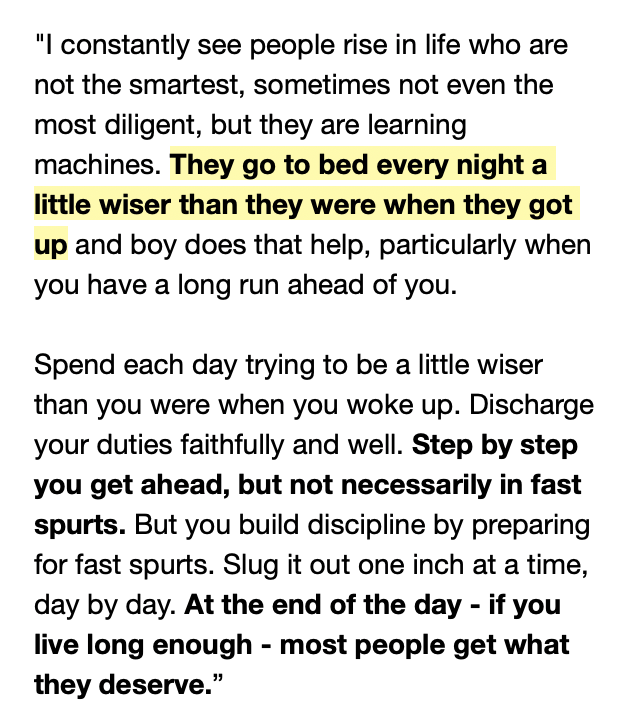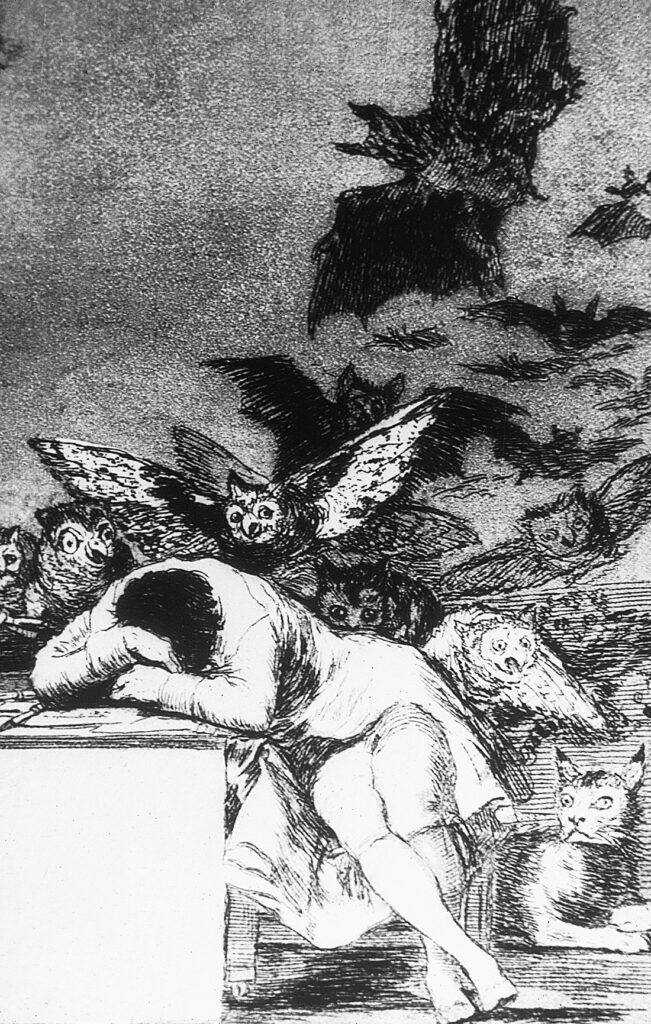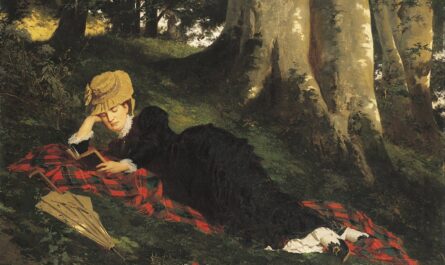Every Friday, I gather links to five essays, articles, or pieces of interest which inspire new and creative thought and post them in my Five for Friday series. This week, I’ve sifted the best ideas I’ve come across in the first six months of 2021 into today’s post.
If you’re interested in hearing more ideas like these, how I find and use new ideas for my work, and the books I’m reading, sign up for my newsletter here.
From Lewis Lapham’s “Merlin’s Owl” Commencement Speech in 2003 at St. John’s College.
Lapham covers a lot of ground here, but my favorite part is the idea that the humanities don’t exist to test skills or prove themselves utilitarian; they simply, profoundly show us how to live well, to be examples of the future we can create.
A mistake to think of the humanities as luxuries, or as a decent appearance that must be kept up, like the country club membership or the house in Palm Beach. Necessities. I can think of no other set of studies more relevant “The truth isn’t about the acquisition of doctrine or the assimilation of statistics, not even about the chicanery in Washington or the scandal in Santa Monica. It’s about the courage to trust one’s own thought and observation, to possess one’s own history, speak in one’s own voice,” to our present circumstance. Our techologists bear comparison to the sorcerer’s apprentice, producing continuously improved means toward increasingly ill-defined ends. Unless we look to the humanities to clean up the mess, we stand a better than even chance of killing ourselves with our new toys.
…
The future turns out to be something that you make instead of find. It isn’t waiting for your arrival, either with an arrest warrant or a band, nor is it any further away than the next sentence, the next best guess, the next sketch for the painting of a life portrait that might become a masterpiece. The future is an empty canvas or a blank sheet of paper, and if you have the courage of your own thought and your own observation you can make of it what you will.
Knowing the ending isn’t how you get started.
“Art requires not knowing.” – Austin Kleon
It is a leap of faith into the unknown each and every time you sit down to create anything. Every time you start a new piece, ideas ripple and bounce off one another, creating unforeseen potential paths to explore. Creativity demands exploring those new connections.
How the Smallpox vaccination was mobilized.
The smallpox vaccination was taken around the world in the form of inoculated children, orphans traveling in pairs to help spread this amazing new hope to the world’s population. What a striking image of small children literally representing the hope of the world.
“Edward Jenner developed a vaccine for smallpox in 1799. He had observed that milkmaids who recovered from cowpox, a much milder illness, seemed to also develop an immunity to smallpox. By drawing lymph from cowpox pustules on human skin, Jenner created a humanized cowpox vaccine. (The word “vaccine” was derived from the Latin vacca, for “cow.”)
And so it was that, “in the era before refrigeration, freeze-dried vaccines, and jet aircraft,” writes medical historian John Bowers, “the successful circumnavigation of the globe with the vaccine…rested on a single medium—little boys.” During the long crossing, approximately twenty-two orphans who had not previously contracted smallpox or cowpox were “vaccinated in pairs every ninth or tenth day,” via arm-to-arm inoculation (taking lymph from an unbroken pustule on a recently vaccinated boy and introducing it under the skin of another). This created a vaccine chain—the vaccine remained active and viable for the entire journey.”
via JSTOR.
Sometimes the best way to move forward removing something, rather than adding to what is already there.
People are statistically less likely to consider changes which require subtraction, rather than additional components. This study, published in Nature, specifically cites how writers, along with tech designers and managers, looking to improve their work might overlook the difference doing away with components can make.
“Across eight experiments, participants were less likely to identify advantageous subtractive changes when the task did not (versus did) cue them to consider subtraction, when they had only one opportunity (versus several) to recognize the shortcomings of an additive search strategy or when they were under a higher (versus lower) cognitive load. Defaulting to searches for additive changes may be one reason that people struggle to mitigate overburdened schedules11, institutional red tape12 and damaging effects on the planet.”
The question to ask is then, “What can I remove to improve this project?”
Most of today’s necessities are yesterday’s luxuries.
Kitchen appliances, the telephone, and computers all fit this model. What luxury of today will be the necessity of tomorrow?
Paul Graham on New Ideas.
“People will also attack new ideas when they have a vested interest in the old ones. It’s not surprising, for example, that some of Darwin’s harshest critics were churchmen. People build whole careers on some ideas. When someone claims they’re false or obsolete, they feel threatened.
Few understand how feeble new ideas look when they first appear. So if you want to have new ideas yourself, one of the most valuable things you can do is to learn what they look like when they’re born. Read about how new ideas happened, and try to get yourself into the heads of people at the time. How did things look to them, when the new idea was only half-finished, and even the person who had it was only half-convinced it was right?”
Don’t be surprised by objections when you voice new ideas, and, reciprocally, maybe don’t voice your own objections to new ideas. Ideas don’t occur fully formed, but as a tiny germ of an idea.
Emerson’s Originality
“I will learn from everyone and be no one’s disciple.”
—Ralph Waldo Emerson
On going to bed a little wiser.

We Don’t Kill Time.
“Men talk of killing time, while time quietly kills them”
— Dion Boucicault
Be wary of how you approach time, as time kills us.
On the relationship between society and enjoyment.
“Philosopher Todd McGowan said, I think politics is a struggle over the distribution of enjoyment.
Even if that’s not correct, it feels to me like the kind of provocative little brain bomb that can be very useful to hear. What would it mean if it was correct?” “
Quote from author David Moldawer
Second Degree Dinners
A great idea on meeting interesting people when you move to a new city.
“A Second-Degree Dinner brings together 6 people who, mostly, don’t know each other. There are two “hosts.” Both hosts invite someone who they enjoy spending time with and that they think is interesting.
Then, both of their invitees are expected to invite someone that they think is interesting and send them the invitation as well.
This way, the two hosts and the two initial invitees only know two other people at the dinner. They get to meet three new people.
Best of all, you’re only meeting pre-vetted people. No weirdos, not some rando who’s trying to sell you on their social media consulting, only cool people.”
You can’t rely on motivation.
“Discipline is more reliable than motivation.” – Shane Parrish
Create a disciplined environment, which makes working on your goals automatic, and you won’t need to rely on motivation. You’ll be automatically propelled into action because it will be the path of least resistance.
Goya’s “The Sleep of Reason Produces Monsters”

Goya’s caption for this print : “Imagination abandoned by reason produces impossible monsters; united with her, she is the mother of the arts and source of their wonders”.
I love that Goya highlights the need for both dreaming and pragmatism; both are essential progress forward in the arts, technology, science, or any other social enterprise.
Viktor Frankl on Believing in Others
“If we take man as he really is, we make him worse, but if we overestimate him …. If we seem to be idealists and are overestimating, overrating man, and looking at him that high, here above, you know what happens? We promote him to what he really can be.”
Holocaust survivor Viktor Frankl speaks with authority when he discusses the differences between viewing people as they are versus what they are capable of achieving. As always, how we view others says more about us than the people we’re observing.
C.S. Lewis on Favorable Conditions
“We are always falling in love or quarreling, looking for jobs or fearing to lose them, getting ill and recovering, following public affairs. If we let ourselves, we shall always be waiting for some distraction or other to end before we can really get down to our work. The only people who achieve much are those who want knowledge so badly that they seek it while the conditions are still unfavorable. Favorable conditions never come.”
If you’re waiting for the opportune moment to start your new project or learn that new skill, this is your sign. Favorable conditions never come.
Yes and No
“The oldest, shortest words – ‘yes’ and ‘no’ – are those which require the most thought.” – Pythagoras
Thoughts of revenge?
“The best revenge is not to be like that.” – Marcus Aurelius. Simple and elegant.
The distinguishing skills of the 21st Century
“The illiterate of the twenty-first century will not be those who cannot read and write, but those who cannot learn, unlearn, and relearn.” – Alvin Toffler
This quote inspired my series on using the internet as a research tool.
Where do ideas come from?
“During the initial introduction to print reading, we want children to learn that reading takes time and gives back thoughts that continue long after a story is finished. […] Through this five- to ten-year age period, the goal is to instill in children the expectation that if they take their time, they will have their own ideas.”
— researcher and author Maryanne Wolf on reading and specifically, introducing children to different kinds of texts.
The seemingly basic act of reading is how you and I learn to think, and how we build and develop a richly literate and functional society.
Akrasia
The Greek word “akrasia” describes when you know what to do in theory, but don’t act on it in practice. The literal translation is “weakness of will.” It describes a lack of self-control, or acting against one’s best interest.
Socrates didn’t believe that any man, knowing the best option, would choose to do something else. Aristotle understood akrasia as an act of opinion. He understood good as being separate from our desires; good might or might not line up with those desires. If they do line up, it’s only incidental.
The term introduces a great discussion on human nature, motivation, and why we might act against our better selves.
If you’re interested in hearing more ideas like these, how I find and use new ideas for my work, and the books I’m reading, sign up for my newsletter here.




